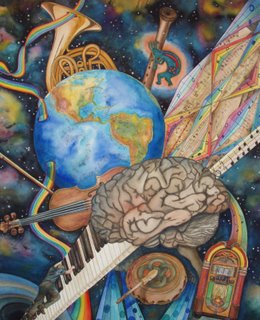
Of course we celebrate the fun of playing an instrument and making music, but did you know you are giving your child many advantages in life?
34% Higher Spatial-Temporal Reasoning
34% Higher Spatial-Temporal Reasoning has been proven in students who study music. Spatial reasoning is important to core concepts in mathematics, such as proportions and fractions, as well as many other fields. The effects of music instruction on spatial reasoning stay even after they discontinue lessons, as long as they start early (5 and younger).
Students who have eight or more years of music study also use both sides of the brain more and have higher IQs than average students.
“By bringing out and exercising musical ability in children, you nurture the development of their intelligence.” ~Dr. Mark Tramo
Higher SAT Scores
In 2001, SAT takers with coursework/experience in music performance scored higher on the verbal and math portion than students with no coursework/experience in the arts. Source: Profile of SAT and Achievement Test Takers, The College Board, compiled by Music Educators National Conference, 2001.
Better Standing in College Admissions
Music majors are the most likely group of college grads to be admitted to medical school. Physician and biologist Lewis Thomas studied the undergraduate majors of medical school applicants. He found that 66 percent of music majors who applied to med school were admitted, the highest percentage of any group. For comparison, (44 percent) of biochemistry majors were admitted. Also, a study of 7,500 university students revealed that music majors scored the highest reading scores among all majors including English, biology, chemistry and math. Sources: “The Comparative Academic Abilities of Students in Education and in Other Areas of a Multi-focus University,” Peter H. Wood, ERIC Document No. ED327480 “The Case for Music in the Schools,” Phi Delta Kappan, February, 1994
College-age musicians are emotionally healthier than their non-musician counterparts. A study conducted at the University of Texas looked at 362 students who were in their first semester of college. They were given three tests, measuring performance anxiety, emotional concerns and alcohol related problems. In addition to having fewer battles with the bottle, researchers also noted that the college-aged music students seemed to have surer footing when facing tests. Source: Houston Chronicle, January 11, 1998
Higher Income in Adulthood
Studies show students with a musical education earn more as adults! A recent study by Harris Interactive shows that 83% of people who make more than $150,000 a year had some type of musical training when they were young. According to the study, conducted in October of 2007, 86% of college graduates and 88% of people with postgraduate degrees had music lessons as children. That shows that being connected with music is important, said Regina Corso, director of the Harris Poll.